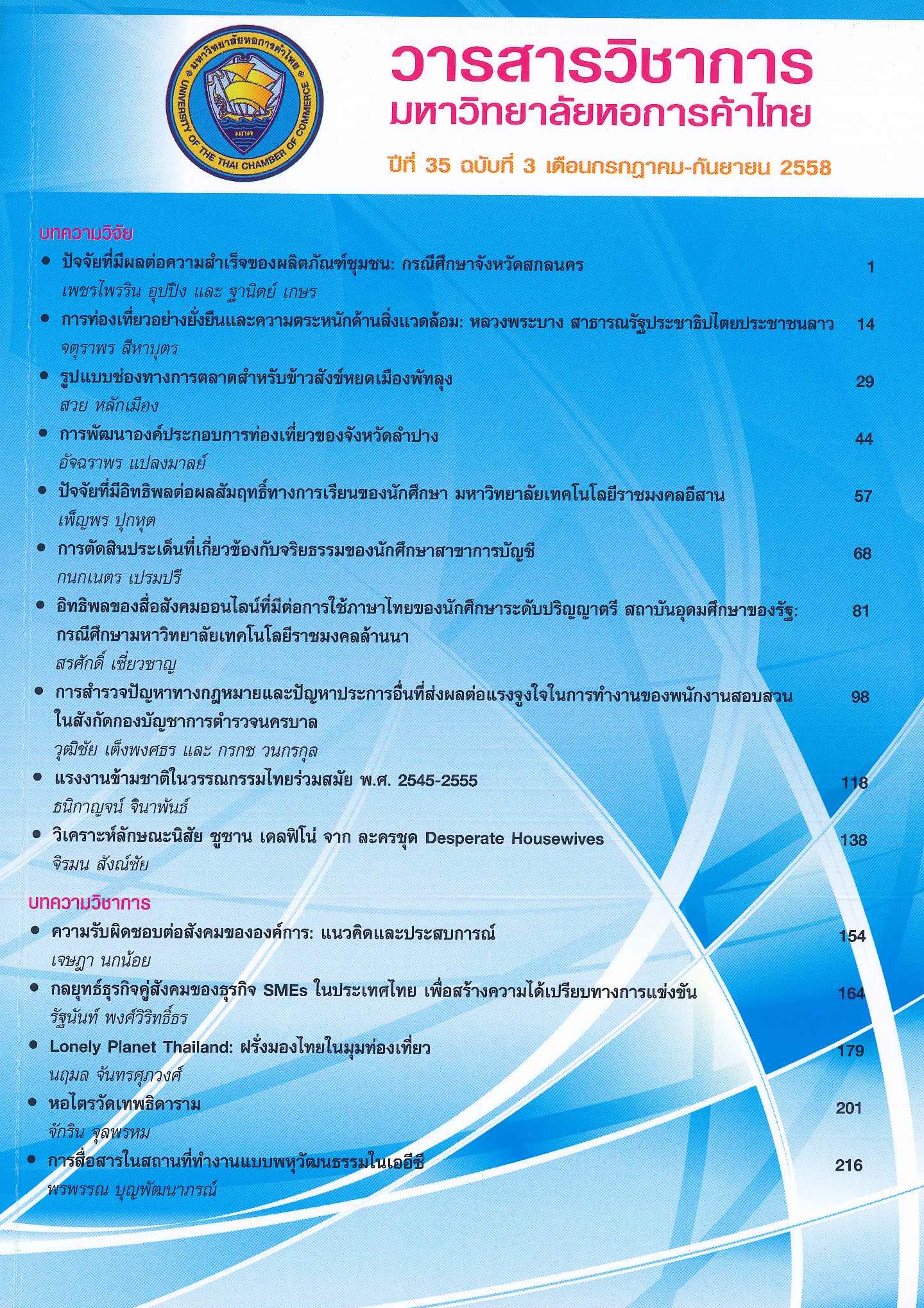Creating Shared Value in Thai SMEs for Competitive Advantage
Main Article Content
Abstract
The Business practices of SMEs wishing to apply the Creating Shared Value for competitive advantages strategy should only focus on improving society in general, or not to create a marketing image for the organization. However, it is also about adopting activities or a projects to create awareness of all parties involved both within the organization and without the organization rather than just solving social problems. It also has to be based on the expertise of the organization to create activities that result in more action than just providing information to third parties. When solving local community problems, the context of the location of the organization will be relevant at the societal level, community level and might also affect social change on a global scale. Therefore, to develop SMEs business operation by applying Creating Shared Value for competitive advantages strategy, it is important to focus on the following: 1) The invention of new products should meet the needs of the society and the community, 2)There should be a new standard set for productivity that will focus on social issues, community as well as the Value Chain and 3) The development of the basic infrastructure should be supported in the context of the local community, but still remain conducive for business.
Article Details
ลิขสิทธิ์ของบทความ
ผลงานที่ได้รับการตีพิมพ์ถือเป็นลิขสิทธิ์ของมหาวิทยาลัยหอการค้าไทย ห้ามมิให้นำเนื้อหา ทัศนะ หรือข้อคิดเห็นใด ๆ ของผลงานไปทำซ้ำ ดัดแปลง หรือเผยแพร่ ไม่ว่าทั้งหมดหรือบางส่วนโดยไม่ได้รับอนุญาตเป็นลายลักษณ์อักษรจากมหาวิทยาลัยหอการค้าไทยก่อน
References
Pongwiritton, R., and Pakwipas, P. 2014. ''Guideline on Corporate Social Responsibility Development for Small and Medium Enterprises (SMEs) in Northern Thailand.'' FEU Academic Review 8, 1: 93-103. (In Thai)
รัฐนันท์ พงศ์วิริทธิ์ธร และภาคภูมิ ภัควิภาส. 2556. ''แนวทางการพัฒนาความรับผิดชอบต่อสังคมของธุรกิจขนาดกลางและขนาดเล็กในเขตภาคเหนือในประเทศไทย.'' วารสารวิชาการมหาวิทยาลัยฟาร์อีสเทิร์น 8, 1: 93-103.
Porter, M.E., and Kramer, M.R. 2006. ''Strategy and Society: The Link between Competitive Advantage and Corporate Social Responsibility.'' Harvard Business Review 84, 12: 78-92.
Porter, M.E., and Kramer, M.R. 2012. ''The Ideas Drawn from Creating Shared Value.'' Harvard Business Review 90, 1: 52-64.
Porter, M.E., and Kramer, M.R. 2013. "Competing by Saving Lives." Harvard Business Review 91, 1 1-23.
Stock Exchange of Thailand. 2012. Corporate Social Responsibility Institute [Online]. Available: https://www.set.or.th/
setlearningcenter/files/CSRI_195.pdf
Thai Corporate Social Responsibility. 2014. SVOI Tools: The Beginning of "Shared Value Initiative" [Online]. Available:
https://thaicsr.sharefile.com/d/s58a17bea485486e8
Thailand. Office of Small and Medium Enterprises Promotion. Small and Medium Enterprises Situation Annual Report
(White Paper) [Online]. Available: https://cms.sme.go.th/cms/c/portal/layout?p_l_id=22.150 (in Thai)
สำนักงานส่งเสริมวิสาหกิจนาดกลางและขนาดย่อม. 2551. รายงานสถานการณ์วิสาหกิจขนาดกลางและขนาดย่อมประจำปี (White
Paper) [Online]. Available: https://cms.sme.go.th/cms/c/portal/layout?p_l_id=22.150
Thaipat Institute. 2013. Creating Shared Value [Online]. Available: https://www.thaicsr.com/2014/03/creating-shared-value-csv.html (In Thai).
สถาบันไทยพัฒน์. 2556. กลยุทธ์ธุรกิจคู่สังคม [ออนไลน์]. เข้าถึงจาก: htp://www.thaicsr.com/2014/03/creating-shared-value-csv.html
Wiriyapipat, Nipa. 2009. ''Trend of CSR: Gearing towards ISO 26000.'' University of the Thai Chamber of Commerce Journal 29, 3: 193-205. (In Thai).
นิภา วิริยะพิพัฒน์. 2552. ''ก้าวทันกระแส CSR: ความพร้อมสู่มาตรฐาน ISO 260000.'' วารสารวิชาการ มหาวิทยาลัยหอการค้าไทย 29, 3: 193-205.

